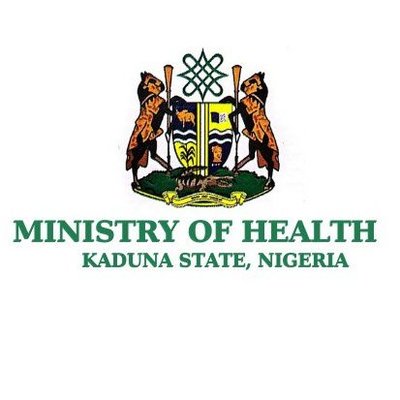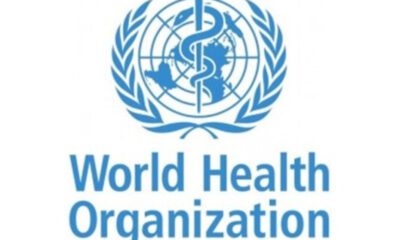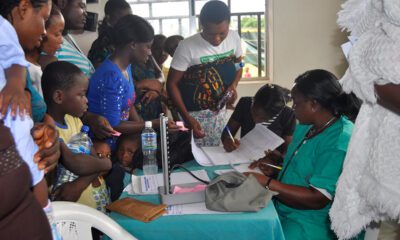Health
NCDs will be leading cause of mortality in Africa by 2030 – WHO

The World Health Organisation (WHO) says Non-communicable Diseases (NCDs) will become the leading cause of mortality in Africa by 2030 if urgent measures are not executed by member states.
Dr Matshidiso Moeti, WHO Regional Director for Africa, joining virtually, made the assertion on Tuesday at the opening of the first International Conference on PEN-Plus in Africa (ICPPA 2024) in Dar es Salaam, Tanzania.
The ICPPA 2024, holding from April 23 to April 25, is aimed at addressing severe NCDs in Africa.
It is being hosted by the WHO Regional Office for Africa, Helmsley Charitable Trust, and the United Republic of Tanzania. Moeti urged member states to embrace strategies that would help to address the issue.
“We are faced with non-communicable diseases and data from low and middle income countries show that 26 per cent of total health spending was due to NCDs, second only to infectious and parasitic diseases.
“Meaning it is urgent to give these often overlooked diseases priority attention as Africa is severely affected and more than in any other place in the world.
“The surge in the burden of NCDs on our continent over the past two decades, is driven by increasing incidences of risk factors, such as unhealthy diets, reduced physical activity, obesity, and air pollution.
“NCDs are set to overtake communicable, maternal, neonatal and nutritional diseases combined as a leading cause of mortality in Africa by 2030.
“And here, the NCDs are called silent epidemics. Unfortunately, this rapid devolution, with a higher mortality rate has not been recognised in the region, because we’re not investing adequately in detecting and lowering the burden of these diseases,” Moeti said.
Moeti noted that severe NCDs like type one diabetes, rheumatic heart disease, and sickle cell disease more frequently affect children and young adults in the majority of Africans population.
She advised that Africa must show increased commitment in addressing NCDs with adequate and sustained resources.
She also said there was the need to strengthen accountability and assess the impact of interventions by enhancing surveillance and monitoring.
According to Moeti, this can be achieved using reliable and timely data at national and sub national levels to drive policy and action as we move forward.
Ms Elke Wisch, UNICEF Representative to Republic of Tanzania, said that collaboration was at the heart of collective response to tackling NCDs.
“Today’s gathering underscores the urgency and importance of addressing NCDs comprehensively and collaboratively.
“The WHO package of essential non communicable interventions for PEN, for primary healthcare and low resources settings, and the recently launched regional strategy on PEN-Plus provides a strategic framework for tackling NCDs at their roots,” she said.
Also speaking, Ummy Mwalimu, Minister of Health, Tanzania, said that non communicable diseases NCDs, have become a formidable threat to the health and wellbeing of “our people.”
She urged for collective efforts to address these threats.
“They are silently affecting the lives of our citizens, our communities, undermining the progress we strive to achieve as a nation.
“The impact of these diseases extends beyond individual suffering.
“It affects our communities, our economy, and ultimately the future of our nations in our continent.
“Yet, in the face of these challenges, we are not discouraged together. We have chosen to confront these non-communicable diseases.’’
She urged for lifestyle change as positive way to combatting the negative outcomes of NCDs.
James Reid, Programme Officer for the Helmsley Charitable Trust’s Type 1 Diabetes (T1D) Programme, said he was happy at the level of interest and momentum in engagements to address NCDs, especially Type 2 diabetes.
He, however, identified finance as one of the biggest challenge and hindrance. He said that while political leaders and stakeholders identify the challenges that NCDs pose, the strategies to prevent them, especially NCD care, were limited.
“Leadership for driving of PEN-Plus is very important to make sure that ministry of health leaders and all others involved, really understand how to change the dynamics as well as adopt solutions to suit specific localities,” she said.
WHO’s PEN-Plus (Package of Essential NCD-Plus), is a regional integrated care delivery strategy to address severe non-communicable diseases at first-level referral health facilities.
At the 2022 WHO Regional Committee Meeting for the African Region, the 47 Member States of the AFRO region voted to adopt the PEN-Plus strategy.
It is focused on alleviating the burden among the poorest children and young adults. This is by increasing the accessibility and quality of chronic care services for severe NCDs including Type 1 diabetes, rheumatic heart disease, and sickle cell disease.
ICPPA 2024 provides opportunity to shore up international support for scaling up PEN-Plus in the African Region. Also, the conference serves as a platform to raise awareness of severe NCDs, share lessons from countries implementing PEN-Plus and identify opportunities to strengthen NCD management.
Health
FG bans use of foreign syringes, needles in tertiary hospitals


The Federal Government has mandated all Chief Medical Directors (CMDs) and Medical Directors (MDs) of Federal Tertiary Hospitals to procure needles and syringes solely from NAFDAC-approved local manufacturers.
The new directive is contained in a circular addressed to all CMDs and MDs signed by the Minister of State for Health, Dr Tunji Alausa, on Friday.
The minister said that the directive was aimed at boosting domestic production and shielding the country’s manufacturing sector from the influx of foreign goods.
The circular also mandated NAFDAC to stop issuing licences for the importation of foreign manufactured needles and syringes.
Alausa said the health sector had dentified local pharmaceutical industries that produce needles and syringes that were in serious trouble because of the practice.
He also said that out of the nine local pharmaceutical companies that produced needles and syringes eight years ago, six have folded up due to the dumping of largely substandard goods into the market.
“Mr President has directed that this must stop. We all agreed to take the necessary steps to immediately remedy this sad situation.
“Pursuant to this, NAFDAC has been mandated to stop issuing licences for the importation of foreign manufactured needles and syringes.
“It is also to de-list companies involved in the importation of these products going forward,” he said.
Alausa said ”all our tertiary hospitals are hereby directed to procure needles and syringes for your hospital needs from only the NAFDAC-approved local manufacturers listed below are listed either directly or through any of their vendors.
“EL-Salmat Pharmaceuticals Company Ltd Block, Brand Name: Salmaject, HMA Medical Ltd., with brand Name: Deleject and Afrimedical Manufacturing and Supplies Ltd.”
He also listed some of the distributors of the listed companies in some states of the Federation for easy access to assist in making the procurement process easier in the various institutions.
Health
KDSG trains 180 Red Cross volunteers on Lassa Fever intervention


The Kaduna State Ministry of Health has begun a three-day training for 180 Red Cross volunteers on Lassa fever intervention.
The training, which is facilitated by the ministry and funded by the Red Cross, is meant to equip the volunteers selected from 5 LGAs in the state with necessary skills.
The volunteers were drawn from Zaria, Igabi, Kaduna South, Kaduna North and Chikun Divisions.
The State Epidemiologist, Dr Jeremiah Dikwu, said the volunteers were trained with the knowledge needed to massively intervene during cases of Lassa fever in the state.
He said that the intervention would include Risk Communication and Active Case Search, Psychological First Aid, Rodent Control and Hygiene Promotion for the next 3 months.
Dikwu said the training started with 30 volunteers on surveillance and would end with the training of 150 volunteers on Risk Communication and Community Engagement .
According to him, Lassa fever is a viral hemorrhagic fever transmitted by rats.
He added that Lassa fever has been known since the 1950s, but the virus was not identified until 1969, when two missionary nurses died from it in the town of Lassa in Nigeria.
Dikwu added that Lassa fever was caused by a single stranded RNA virus and disseminated systemic primary viral infection.
“The main feature of fatal illness is impaired or delayed cellular immunity leading to fulminant viraemia,” he said
The epidemiologist said that Lassa fever presented symptoms and signs indistinguishable from those of febrile illnesses such as malaria and other viral hemorrhagic fevers such as Ebola.
“It is difficult to diagnose clinically but should be suspected in patients with fever (e”38°C) not responding adequately to antimalarial and antibiotic drugs.
“The most useful clinical predictors of Lassa fever are fever, pharyngitis, retrosternal pain, and proteinuria for diagnosis; and fever, sore throat, and vomiting for outcome,” Dikwu said.
He said that Ribavirin and general support were needed.
“Ribavirin is almost twice as effective when given intravenously as when taken orally, and if given within six days of the start of illness it may reduce deaths by 90 percent.
“Dehydration, oedema, hypotension, and poor renal function are common; fluid replacement or the use of blood transfusion requires careful monitoring,” he said.
Dikwu said the volunteers would be carrying out Risk communication and Community engagement, Active Case Search, Psychological First Aid, Rodent Control and Hygiene Promotion
Health
Assembly passes Kano Pre-Marital Health Screening Bill


Kano State House of Assembly has passed a bill for a law to compel intending couples to undergo HIV, hepatitis and sickle cell anaemia screening before marriage.
The passage followed deliberations in the Committee of the Whole House during plenary session,
presided over by the Speaker, Ismail Falgore on Monday in Kano.
After deliberations, the lawmakers approved the 3rd reading of the bill, read by the Deputy Clerk, Alhaji Nasiru Magaji.
Shortly after passage of the bill, the Majority Leader of the house, Lawan Hussein (NNPP-Dala), stated that “any person
intending to marry shall first submit self for medical examinations.”
He said the bill was considered and passed after the 3rd reading, following various legislative processes.
The leader further said that the bill was passed because the state had been battling with different health issues, including
HIV because people go into marriages without medical screening.
He said that the bill, if signed into law, would save many lives and curb the spread of life-threatening diseases.
“The bill will safeguard the health of citizens by institutionalising pre-marital testing to check the spread of diseases
like hepatitis, HIV and sickle cell anaemia,” he added.
-
capital market2 years ago
Rt.briscoe, FBNH, Others halts negative performance of stock market
-
Finance3 months ago
Court orders Sen. Victor Umeh to repay N136m bank debt to AMCON
-



 Abuja Update2 months ago
Abuja Update2 months agoUNDP, FG partnership needed to achieve inclusion, equity- Minister
-
Abuja Update1 month ago
Banks drive stock market performance with N147bn gain
-



 Business2 weeks ago
Business2 weeks agoTingo Group unveils Tingo Electric, Tingo Cola drink at Lagos launch
-



 Health3 weeks ago
Health3 weeks agoCapacity training will reduce migration of health workers- NPHCDA
-
News4 months ago
Oil thieves sponsoring malicious media campaign against Navy – Spokesman
-



 Infotech1 month ago
Infotech1 month agoWorld Backup Day: NITDA urges Nigerians to ensure backup of data












